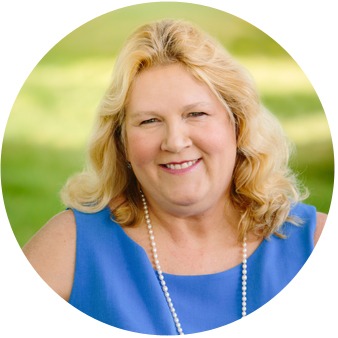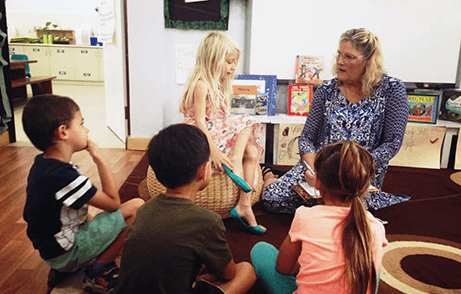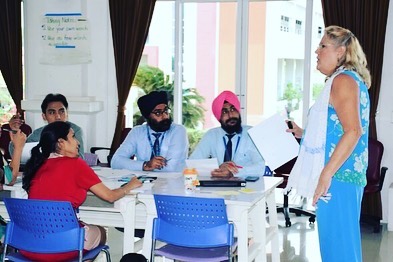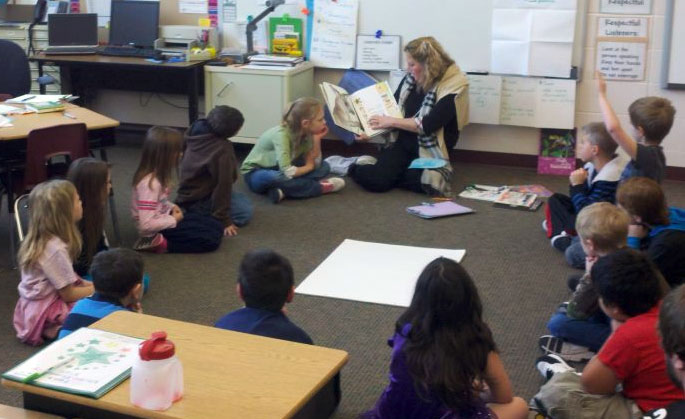Building Curriculum, Supporting Educators, and More with Laura Benson

This past month, Laura Benson (ISS Director of Curriculum and Professional Development) celebrated five years with ISS and forty years as an educator. Laura is a well-loved member of the international education community, known for her extensive curriculum experience and resources, hands-on support, and uplifting spirit. We are lucky to have her at ISS and were excited to catch up with her! Learn about her work, approach for international educators feeling stuck in their pedagogy, highlights of time at ISS, and more.
Congratulations on your 5 year ISS anniversary, and thank you so much for taking the time to chat today, Laura! As Director of Curriculum and Professional Development, what does your work look like?
It looks different every day, which is really delightful and really energizing. Over the course of the school year, most of our ISS schools contact me as they’re working on curriculum or have a professional learning need for their faculty. My work is very customized to what schools need. We are scattered around the world, so I do a lot of support from afar through Skype, Zoom, or email. The time differences is one reason I’ve developed resource padlets and tried to really cultivate Slack groups accessible at any time. I also broker connections as a big part of my work; if I get a question around AP Science or Art that I don’t know the answer to, I’ll connect them with a fellow colleague or peer in one of our schools.
I also travel to visit schools per request and go to the international education teachers conferences for ISS. Usually, from the end of July to Thanksgiving, I’m in schools supporting through professional development workshops. The actual content and schedule is developed collaboratively. At schools where the PD budget is not large, we work flexibly. I can provide workshops or webinars using technology for a full faculty meeting. Especially when they do not have an in-school curriculum person, educators at these schools still have the opportunity for professional growth without the fiscal burdens of physically bringing someone in. My job is very customized and tailored; each school gets a lot of autonomy around what we do together.
Say a school or educator is struggling to develop their curriculum, or feels frustrated or stuck in their classroom or pedagogy. What advice, resources, or encouragement do you offer? Where do you start?
The first part is to look at the human level, along the lines of Maslow’s hierarchy of human needs. In these situations, I want to know, is that person feeling lonely and homesick? Are they feeling isolated? Sometimes people are feeling frustrated or challenged because of the work, or because it’s their first couple of months in a new country and new school. In international education, you have birthdays away from family, a sick relative back home, or a friend who has just had a baby. Normally, you would have been there with them — and it’s tough not to be. Many times the kind of scenario you proposed is happening because they don’t have a teammate. We have a lot of schools where there just one person per grade level, so I’ll try to connect them with someone who would be a willing friend or partner. If it isn’t me, if they need someone more around their age or content area, I can say, “You would just love talking to Jessica Davis in Bahrain! She’s been working on this too for a couple of years and I know she’d be willing to talk to you.” You just see their shoulders relax. That personal friend or professional friend can make such a difference.

If it’s the practical work that’s frustrating, I’ll collaborate and show them what’s already there. We’re really lucky to have the online platform Rubicon Atlas that makes it possible to share curriculum from all our schools with each other. Frustrations arise when educators think they’re going to have to start from scratch, and many new people (and even some veteran people) don’t realize these rich resources are there for them. I can offer to develop a study together, look at these units that are already there. I often encourage them to harvest curriculum they already like. Those lesson plans you admire from Dalian, Riffa Views? We can take that curriculum and put it into your grade-level curriculum library! It’s problem-solving with them in a very warm and collaborative way.
What do you enjoy about your work? What is challenging about your work, and how do you push through those obstacles?
I really enjoy being helpful — I know that can sound cliche, but I just want to be of help and support at this point in my career. I’m in an advisory role, not a supervisory role, so I’m not there to police anybody or evaluate anyone. I’m there to be supportive in a very genuine way of unconditional love and respect. With experience in international education, you know how hard the school leaders, teachers, parents, and kids work, so I get to proactively think about helpful strategies. I also get asked to do things I don’t really know how to do yet, so I’m never done learning! As for what is challenging…right now, when not in schools or conferences, I’m working remotely here from Colorado. It’s a little isolating at times, so I do treasure times like this call, online meeting times, and especially site visits and conferences. In-person time is becoming more and more precious to me. You have to find ways to make things work when you work from home; I’ll go on walks, take my books to a coffee shop, just change the scenery.

What has your own journey in an education career looked like?
Like so many of the students in our international schools, I was a Third Culture Kid myself. My parents began to live and work abroad when I was in middle school, and pretty much my whole life, we were overseas or moving. I primarily lived in England, but we also spent a lot of time in the Middle East and Greece. My brother died when I was in high school, along with other people from American School of London. During that period of time, I decided I needed to do something really meaningful with my life since my brother wasn’t here anymore. Being a teacher seemed like a really good way to be supportive to people. I’m now in my 40th year of education.
I was a long-time classroom teacher of pretty much every grade and knew I wanted to support people with their own professional learning and curriculum. I tried to get as much experience as I could over the years with different grade levels of different kinds of schools. My classroom became a lab classroom, and that turned into me starting to consult and present workshops. Through that work, I started to get back into the international ed community. As I ended up working with a fair number of ISS schools, I was drawn to the journey but I didn’t think I’d get offered the job. Then about five years ago, I did! I just really loved talking to Rob Ambrogi and Bruce McWilliams; I came to know Becky Krisulevicz, Charles Gregory, and other wonderful people. Being part of the ISS community and a part of schools has made me feel very blessed for the whole last five years.
When you think about your time working with ISS and ISS schools, are there any stories that come to mind as especially meaningful or memorable to you?
Today actually happens to be Rosanna Walsh’s birthday. She’s a teacher from Shekou who passed away in December. One of the things I was struck by with Rosie was how her heart and actions conveyed so much about ISS schools. Rosie started a charity effort of knitting hats for Syrian refugees, and she shared it with SIS students over the years. The boys and girls at Shekou middle school still knit as a memorial to her now, sending hats to the organization she had worked with. She was such an inspiration. It’s that kind of thing; Cayman International School cleans up their beaches, International School of Aruba makes prosthetic limbs in their maker lab with a 3D printer, and with their service-learning efforts, so many of our schools make a big difference in their communities. People at these schools are just really caring, welcoming. Whether it’s a classroom, having dinner with the faculty, you just see it. These are good people.
You are so well-known for your positivity at ISS and in the communities you touch. Whether in person or in writing, you’re encouraging, appreciative, and faithfully kind. Can you point to where that warmth comes from?
That’s very kind of you to say. I try to live my life for my brother and myself, so that’s a big part of it. I definitely have a strong spiritual faith and believe in being kind and just demonstrating love as much as possible. In my job, I think of myself as a soft place to land for people. Nobody has enough of those in their life! I’m just one of them, but I do think in international education, living far away and with the intensity of the work, it’s vital for me to to to be extra patient and extra loving. I’m not always patient, that’s for sure; people have been really generous to me about the positive kindness. That says more about them since they tend to see the best in one another. But I think I do try to work from a compass of love and kindness. Not everyone believes you at first; I know I’ve run up against some skepticism, but that’s understandable and they have their right to feel that way. I just don’t know any other way to be.

We really appreciate the sunshine you bring to ISS, Laura, and to all the work you do with schools and students around the world. Thank you for your time today! Anything else you wanted to share that we forgot to ask?
I know there are so many organizations and nonprofits out there doing wonderful work; ISS has been such a great fit and a great journey for me. These past five years have made me feel really blessed, really honored, and excited to move forward!
If you’re an ISS educator or at an ISS school, write to Laura at LBenson@ISS.edu to be added to the ISS Slack and resource groups. You can also learn more about ISS Professional Development initiatives here.






